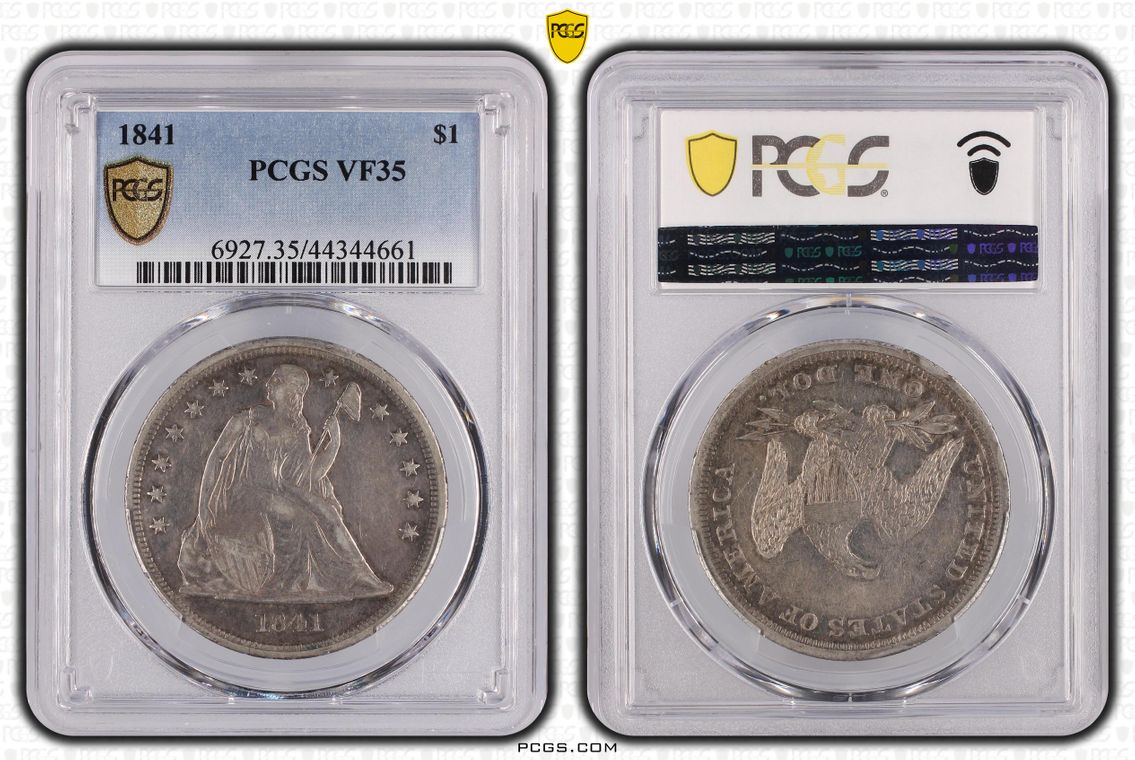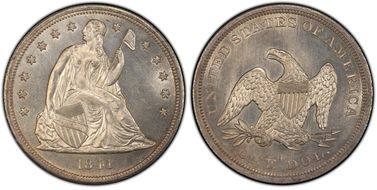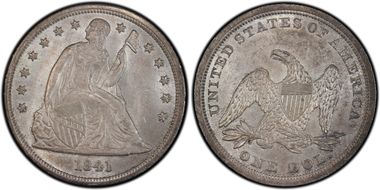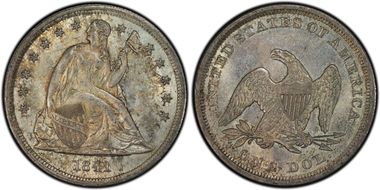1841 $1 VF35 认证号44344661, PCGS号6927
专家评论
Q. David Bowers
The following narrative, with minor editing, is from my "Silver Dollars & Trade Dollars of the United States: A Complete Encyclopedia" (Wolfeboro, NH: Bowers and Merena Galleries, Inc., 1993).Coinage Context
Silver bullion a problem: As noted under 1840, the United States had but a small domestic supply of silver bullion. This continuing problem was the focus of a commentary in the 1841 Annual Report of the Director of the Mint:
The principal mint and its branches have all been in good condition throughout the year, there has been no unusual interruption in their operation; but, in consequence of the small supply of bullion, they have been only partially employed, so that the amount of work done by them has fallen far below what they are able to execute. The whole coinage of all the mints was less than two and a quarter million; while the Philadelphia Mint alone is capable of coining 12 million, and in 1836 did actually coin more than seven and three-quarters.
The same report showed the main sources of silver:
Bullion from North Carolina worth $4,198 Foreign bullion $210,546
Mexican dollars $272,320
Dollars of South America $14,292 European coins $55,692
Silver plate (Tableware and other wrought items, often dented or otherwise damaged.) $5,398
The above figures totaled $562,446, in comparison to a total silver coinage (of all denominations from the half dime to the dollar) for the year of $577,750. However, the total supply of bullion had little to do with silver dollar coinage. The number struck depended solely on the bullion deposited by those specifically asking for dollars. (Of course, had there been more bullion, proportionally more dollars would have been struck.) Others deposited silver bullion for dimes, half dollars, etc. This changed after the Act of February 21, 1853, when minor silver coins could no longer be requested for bullion.
A potential North Carolina source: In this year for the first time deposits of silver were received at the Philadelphia Mint from native mines ill the United States, coming in this instance from argentiferous carbonate of lead found in Davidson County, North Carolina. The proprietors of the mine informed Robert M. Patterson, director of the Mint the future silver output would be "largely productive." The amount of silver produced must have been small, for later Mint reports did not mention silver from this source.
Numismatic Information
Circulated grades: The mintage of 1841 was fairly high, but the availability of circulated specimens belies this. In general, fewer circulated 1841 dollars appear on the market than do those dated 1840, although nearly three times as many 1841s were struck. The explanation for this is not known. Such mysteries are intriguing to contemplate; they contribute much to the mystique of the Liberty Seated silver dollar series. How much more interesting this is than if everything were known! While R.W. Julian, Walter H. Breen, and others have examined many Mint and other government records, there are still many nineteenth century publications and documents that await the careful scrutiny of the scholar. More research has been done on Liberty Seated silver dollars in the past 25 years than in the preceding century. The enthusiasm of numismatists today augurs well for the future, and, undoubtedly, many more discoveries remain.
Mint State grades: In Mint State the 1841 is very rare because virtually all coins were placed into circulation (or perhaps there is another explanation; ah, sweet mystery of numismatics!). There is no record that any were saved by the Mint or Treasury.
The 1841 dollar in Mint State is an excellent example of a condition rarity. 1841 dollars are common in worn grades but are rarities if Uncirculated. Until certification arrived (with PCGS in 1986), pieces described in auction catalogues and fixed price lists as Mint State or Uncirculated were often apt to be EF or AU, sometimes even cleaned and polished. Even dollars which the American Numismatic Association Certification Service officially graded as MS-60 in the years before 1986 were found in some instances of later regrading by tightened interpretations to be in the AU range. (This unreliability of old catalogue data was mentioned earlier under Proof dollars of 1840.) "This is very underrated in Mint State…," reported Chris Napolitano in 1992. (Letter to the author, June 26, 1992.)
Varieties
Circulation strikes:
1-2. Normal Date: Breen-5426. Obverse: Circulation strikes occur with at least two minor variations in date position, indicating at least two obverse dies must have been employed. As is true of the entire Liberty Seated dollar series, no exhaustive study of die variations has ever been published (exhaustive in the sense of what Leroy C. Van Allen and A. George Mallis have done for the Morgan and Peace dollar series).
Estimated quantity melted: Unknown
Characteristics of striking: Striking varies; some have flatness in areas, including stars and/or denticles.
Known hoards of Mint State coins: None
Commentary
While 1841 is very common in worn grades, in Mint State or Proof it is a rarity.
PCGS #
6927
设计师
Christian Gobrecht
边缘
Reeded
直径
38.10 毫米
重量
26.73 克
铸币数量
173000
金属成分
90% Silver, 10% Copper
更高评级数量
445
评级较低的钱币数量
105
地区
The United States of America
价格指南
PCGS 数量报告
拍卖 - PCGS 评级的
拍卖 - NGC 评级的
稀有性和存量估计 了解更多
| 所有评级 | 2300 |
| 60或以上 | 70 |
| 65或以上 | 2 |
| 所有评级 | R-4.5 |
| 60或以上 | R-8.3 |
| 65或以上 | R-9.9 |
| 所有评级 | 22 / 30 TIE |
| 60或以上 | 16 / 30 TIE |
| 65或以上 | 7 / 30 TIE |
| 所有评级 | 33 / 45 TIE |
| 60或以上 | 23 / 45 TIE |
| 65或以上 | 8 / 45 TIE |























